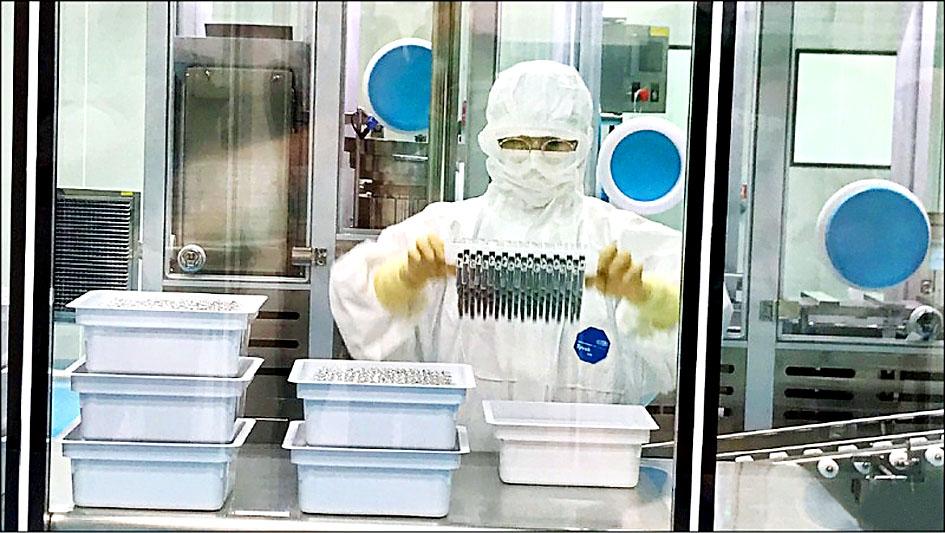Medigen Vaccine Biologics Corp (高端疫苗) on Tuesday said it has begun manufacturing its experimental COVID-19 vaccine, which it hopes to offer once it obtains an emergency use authorization (EUA).
The company has started producing antigens for its vaccine and filling them at a plant in Hsinchu, company spokesperson Leo Lee (李思賢) said by telephone.
“We hope to be able to offer our COVID-19 vaccine immediately after the Food and Drug Administration [FDA] greenlights it,” Lee said, declining to reveal how many doses the company has manufactured.

Photo: Huang Mei-chu, Taipei Times
President Tsai Ing-wen (蔡英文) has said that locally developed COVID-19 vaccines are expected to be available in July.
Medigen is running a phase 2 clinical trial of its experimental vaccine with 3,752 participants, who had been given the second shot by the end of last month, Lee said, adding that it plans to evaluate the drug’s efficacy at the end of this month.
The firm in the middle of next month would submit to health authorities its interim analysis report and hopes to gain the EUA soon, he said.
Asked if it is wise to start production when the FDA might change the vaccine formula, Lee said that the chances of that are slim, as the regulator reviewed the formula after the phase 1 trials.
“We expect two potential conclusions from the regulator’s review next month: pass or fail,” Lee said.
Medigen tested three doses of its vaccine — low, medium and high — in the phase 1 trials, with the medium dose showing the best potential, so the phase 2 trials only use the medium dose, he said.
“Even if the FDA concludes that the medium dose is not strong enough, the formula does not need to be changed, as the issue could be solved by giving people a third shot,” Lee said.
Medigen has not found serious adverse reactions or vaccine-associated enhanced diseases among participants in the phase 2 trials, it said.
An independent data monitoring committee said that its candidate is safe at a meeting on May 8, Medigen said.

Macronix International Co (旺宏), the world’s biggest NOR flash memory supplier, yesterday said it would spend NT$22 billion (US$699.1 million) on capacity expansion this year to increase its production of mid-to-low-density memory chips as the world’s major memorychip suppliers are phasing out the market. The company said its planned capital expenditures are about 11 times higher than the NT$1.8 billion it spent on new facilities and equipment last year. A majority of this year’s outlay would be allocated to step up capacity of multi-level cell (MLC) NAND flash memory chips, which are used in embedded multimedia cards (eMMC), a managed

CULPRITS: Factors that affected the slip included falling global crude oil prices, wait-and-see consumer attitudes due to US tariffs and a different Lunar New Year holiday schedule Taiwan’s retail sales ended a nine-year growth streak last year, slipping 0.2 percent from a year earlier as uncertainty over US tariff policies affected demand for durable goods, data released on Friday by the Ministry of Economic Affairs showed. Last year’s retail sales totaled NT$4.84 trillion (US$153.27 billion), down about NT$9.5 billion, or 0.2 percent, from 2024. Despite the decline, the figure was still the second-highest annual sales total on record. Ministry statistics department deputy head Chen Yu-fang (陳玉芳) said sales of cars, motorcycles and related products, which accounted for 17.4 percent of total retail rales last year, fell NT$68.1 billion, or

In the wake of strong global demand for AI applications, Taiwan’s export-oriented economy accelerated with the composite index of economic indicators flashing the first “red” light in December for one year, indicating the economy is in booming mode, the National Development Council (NDC) said yesterday. Moreover, the index of leading indicators, which gauges the potential state of the economy over the next six months, also moved higher in December amid growing optimism over the outlook, the NDC said. In December, the index of economic indicators rose one point from a month earlier to 38, at the lower end of the “red” light.

The global server market is expected to grow 12.8 percent annually this year, with artificial intelligence (AI) servers projected to account for 16.5 percent, driven by continued investment in AI infrastructure by major cloud service providers (CSPs), market researcher TrendForce Corp (集邦科技) said yesterday. Global AI server shipments this year are expected to increase 28 percent year-on-year to more than 2.7 million units, driven by sustained demand from CSPs and government sovereign cloud projects, TrendForce analyst Frank Kung (龔明德) told the Taipei Times. Demand for GPU-based AI servers, including Nvidia Corp’s GB and Vera Rubin rack systems, is expected to remain high,